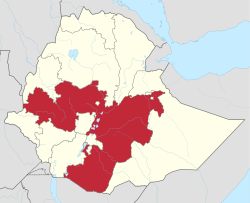
Back صراع أورومو Arabic Канфлікт у Ароміі Byelorussian Conflicto oromo Spanish Révolte oromo French Conflito Oromo Portuguese
This article has multiple issues. Please help improve it or discuss these issues on the talk page. (Learn how and when to remove these template messages)
|
| Oromo conflict | |||||||
|---|---|---|---|---|---|---|---|
| Part of the conflicts in the Horn of Africa and Ethiopian civil conflict (2018–present) | |||||||
 The Oromia Region in Ethiopia | |||||||
| |||||||
| Belligerents | |||||||
|
(until 2018) (initially part of OLF, independent from 2018) (1985−87) (1993–2012)[1] Supported by:[a] (1998–2018)[2] | ||||||
| Commanders and leaders | |||||||
|
(2012−2018) |
| ||||||
| Units involved | |||||||
|
Imperial Ethiopian Army (until 1975) Socialist Ethiopian Liberation Army (1975−1991) ENDF (from 1991) | Oromo Liberation Army | ||||||
| Strength | |||||||
| 182,500 (2011)[6] |
OLF: | ||||||
| Casualties and losses | |||||||
| 1,600−8,900 killed overall[12] | |||||||
| |||||||
The Oromo conflict is a protracted conflict between the Oromo Liberation Front (OLF) and the Ethiopian government.[13][14] The Oromo Liberation Front formed to fight the Ethiopian Empire to liberate the Oromo people and establish an independent state of Oromia. The conflict began in 1973, when Oromo nationalists established the OLF and its armed wing, the Oromo Liberation Army (OLA).[15] These groups formed in response to prejudice against the Oromo people during the Haile Selassie and Derg era, when their language was banned from public administration, courts, church and schools, and the stereotype of Oromo people as a hindrance to expanding Ethiopian national identity.[16][17][18][19][20][21][22]
- ^ WRITENET (2004), p. 8.
- ^ Iaccino, Ludovica (26 February 2016). "Ethiopia claims Eritrea behind Oromo protests but activists warn against 'state propaganda'". International Business Times UK. Archived from the original on 1 July 2017. Retrieved 23 January 2017.
- ^ "Ethiopia Alleges Oromo Protesters Receiving Support From Egypt". Bloomberg. 10 October 2016. Archived from the original on 2017-09-12. Retrieved 2017-01-23.
- ^ "Ethiopian PM announces start date of peace talks with rebel group". 24 April 2023.
- ^ "Ethiopian Government Initiates Peace Talks With Oromo Rebel Group". 24 April 2023.
- ^ "Ethiopia Military Strength". Archived from the original on 14 July 2017. Retrieved 27 October 2014.
- ^ Schmid & Jongman, 2005: 538-539.
- ^ Gérard Prunier. "Armed Movements in Sudan, Chad, CAR, Somalia, Eritrea and Ethiopia" Archived 2016-03-04 at the Wayback Machine. ZIF Analysis. Addis Ababa, febrero de 2008, pp. 13-14.
- ^ a b Østebø, 2011: 289
- ^ Koonings, 2002: 259; Marcus, 2002: 235
- ^ "Country report and updates Ethiopia". Archived 2016-12-20 at the Wayback Machine War Resisters' International. Entre 1974 y 1990 murieron 300 000 soldados etíopes y 230 000 entre enero y mayo de 1991.
- ^ "UCDP Conflict Encyclopedia: Ethiopia". Uppsala Conflict Data Program. Archived from the original on 12 January 2016. Retrieved 7 March 2016.
- ^ "What's Driving Clashes Between Ethiopia's Somali, Oromia Regions?". www.voanews.com. Retrieved 2022-01-18.
- ^ The Oromo Conflict in Ethiopia and the formation of the OLF, n.d., archived from the original on 2021-08-12, retrieved 2021-04-01
- ^ Triulzi, Alessandro (1996). Being and Becoming Oromo. Sweden: Gotab. ISBN 91-7106-379-X.
- ^ Davey, Melissa (13 February 2016), "Oromo children's books keep once-banned Ethiopian language alive", The Guardian, archived from the original on February 14, 2016, retrieved February 14, 2016
- ^ Language & Culture (PDF), archived (PDF) from the original on 2021-04-17, retrieved 2021-02-22
- ^ ETHIOPIANS: AMHARA AND OROMO, January 2017, archived from the original on 2021-04-19, retrieved 2021-02-22
- ^ OROMO CONTINUE TO FLEE VIOLENCE, September 1981, archived from the original on 2021-04-12, retrieved 2021-02-22
- ^ Country Information Report ethiopia, August 12, 2020, archived from the original on April 12, 2021, retrieved August 12, 2021
- ^ Ethiopia. Status of Amharas, March 1, 1993, archived from the original on January 25, 2021, retrieved February 22, 2021
- ^ Bulcha, Mekuria (July 1970), "The Politics of Linguistic Homogenization in Ethiopia and the Conflict over the Status of "Afaan Oromoo"", African Affairs, 96 (384): 325–352, doi:10.1093/oxfordjournals.afraf.a007852, JSTOR 723182, archived from the original on 2021-04-12, retrieved 2021-02-22
© MMXXIII Rich X Search. We shall prevail. All rights reserved. Rich X Search